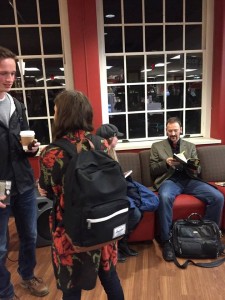
This past Monday evening, the Creative Writing Program kicked off this semester’s reading series with author Darrin Doyle. His most recent book, titled The Dark Will End the Dark (published in February 2015), is a collection of short stories that explore the human body and reason. Miami University professor Dr. Joseph Bates introduced Doyle; the two have been friends since they were in graduate school at University of Cincinnati together.
“You can just imagine what it was like to have these suckers coming at you in a workshop,” joked Bates, referring to Doyle’s work, which can often turn dark and disturbing.
Doyle first read a short story from Dark, entitled “Foot,” followed by a few different stories he is currently working on, entitled “Dangling Joe,” “Party Town,” “Possibilities and Considerations,” and “Perfect Sandwich.” “We always ask our students to share what they’re working on, so I think it’s only fair we do the same,” explained Doyle, who is currently a professor at Central Michigan University.
The pieces that Doyle read all explored different themes. “Foot” is a grisly fable-like tale of a mother’s devotion to her child. “Dangling Joe” is a satire of American society and media, while “Party Town” might resonate deeply with certain residents of Oxford. “Possibilities and Considerations” is an experiment in format that gives a wry, and at some times satirical, insight into life. “Perfect Sandwich” is the story of a man’s desperation to be good enough.
The audience, engaged and enthusiastic throughout the entirety of the reading, supplied no shortage of questions for Doyle, asking about his strategy for writing, influences for different works, and advice on writing a novel. “I’ve written, in the last year, about 23 of these short stories,” said Doyle, referring to his as-of-yet-unpublished works. “It’s weird when you start noticing [recurring] themes.”
When asked what his influences were while writing The Dark Will End the Dark, Doyle said, “Franz Kafka and Flannery O’Connor are two of my biggest influences. Their characters might have a physical ailment, [but] their souls are grotesque… Fairy tales, folk tales, and fables have always had their hold on me… I like the feeling of the surreal that’s grounded in reality.”
As for advice on writing, Doyle says, “It’s great when you’re inspired by an idea… but then you’ve got to sit down and write. One sentence leads to another, and hopefully you surprise yourself a bit.”


